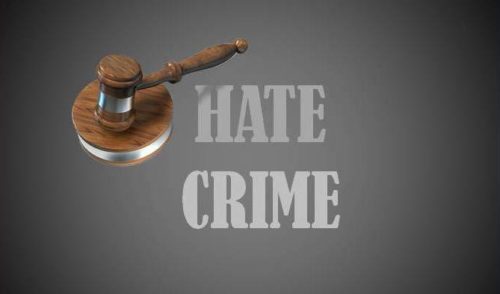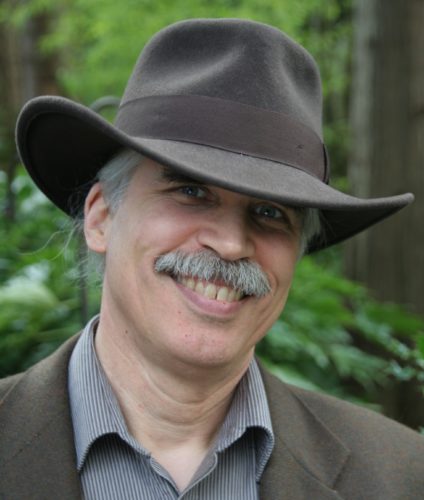TWH – In the wake of Tuesday’s U.S. Presidential election, talk of racism, bigotry, misogyny and hatred has been sweeping conversations, both public and private. In some circles, the rise of President Elect Donald Trump has been compared to the rise of Hitler, and the phenomenon of his success has been compared to that of the Nazi party of the 1930s. With this energy feeding public discourse around the world, Pagans and practitioners of similar earth-based paths are preparing to deal with the possible changes that could come from such a seemingly dramatic shift within the government of the world’s leading superpower.
As a response to the increasing frequency of hate and hate crimes in North America, the New Mexico-based Ardantane Pagan Learning Center invited Canadian Pagan Kerr Cuhulain, to deliver a two-part online class, “Dealing With Hate Crimes”.

Cuhulain lives on the Sunshine Coast of British Columbia, Canada. He is a regular member of the Ardantane faculty and offers various classes via the internet to Ardantane students across North America. He is a retired police officer and dispatcher, who has been a Wiccan for 48 years. During his professional career, he was deeply involved in anti-defamation activism and hate crimes investigations on behalf of Pagan community.
Despite being retired now from the Vancouver Police Department, Cuhulain still takes an active interest in fighting back against intolerant anti-Pagan propaganda. Cuhulain is also the author of a number of Pagan books, including Law Enforcement Guide to Wicca, Pagan Religions: A Handbook for Diversity Training, Witch Hunts and The Wizard: The Story of the First Wiccan Cop to go Public About His Pagan Beliefs.
The relationship between Canada and the U.S. is a close one. On the night of the U.S. presidential election, citizens on both sides of the world’s longest unprotected border sat and watched as the results were reported. In Canada, American politics often outshine domestic ones, dominating the media we share and possessing more scandal and intrigue than domestic news.
For Cuhulain, who is married to an American, this election had some personal overtones. Many of the messages and patterns seen in the media coverage were, he said, familiar to his previous investigations. “What happened back in the 80s and 90s is this thing they called the Satanic Panic, which was an urban legend, or series of urban legends that were launched and sent through the communities in an attempt to create the illusion that there is a problem out there, so that the people putting the information out there could present themselves as the solution,” he explained.
In his online class, he laid out the history of the Satanic Panic, and the strategies used to persecute those deemed “Satanists,” which also included many people of minority faiths – Wiccans being one of the most named. Cuhulain went on to say, “Now there is a new generation out there who isn’t familiar with this history and now it could happen again. I am starting to get requests again, about this stuff, so obviously people are starting to try to do it again. I’m retired, but I have this information and I don’t have a problem putting it out there, so people can see how (hate crimes) happened and recognize these things when they happen again. “

Pagan author & teacher, Kerr Cuhulain (courtesy photo)
Throughout his career, Trump has been quoted as reportedly making many uninformed, bigoted, and racist remarks. Cuhulain warns that such rhetoric can lead to copycat behavior in the general public. “We’ve got a red-haired political candidate running for president in the States who is a narcissistic personality disorder,” Cuhulain said. “And, he is putting out all kinds of misinformation and this encourages other people to do the same. They figure that ‘if someone at that level can get away with it, I ought to be able to do it on my level.’ ”
During Cuhulain’s presentation, one point he stressed is that the projected hate is typically instigated by a very small number of bigoted people, who use various tactics and techniques to make it appear that their opinion is shared by the majority. This can cause the “us against them” sentiment witnessed in Trump’s campaign. By manipulating the media and fears of the people, the few make themselves appear larger than they really are.
Many are now worried that the Trump victory will contribute to what already appears to be an increase in hate crimes. When asked his opinion, Cuhulain said that he wouldn’t rule that out. “It is a possibility that has certainly occurred to me. We are seeing it – we’re seeing people intimidating voting groups that they don’t want to see come to the polls; we are seeing vandalism and all kinds of violent things happening.”
“It’s encouraging people to be paranoid,” he went on to explain. “That is what the Satanic Panic was about; this paranoia that there is the problem, and ‘if we only get rid of THEM, then we’ll be OK.” When the political discourse of America includes proposing a wall to keep out Mexicans, or halting immigration from certain religious or ethnic groups, we see the instilling of the same sort of paranoia.”
Alongside this current of fear, there has also been a spirit of defiance, and a proactive approach by religious and spiritual groups to build a capacity to uncover and combat hate crimes. Ardantane Pagan Learning Center’s offering of Cuhulain’s class is only one example; other individuals and religious groups are also reaching out to Cuhulain, in order to take advantage of his expertise and long history of investigating these cases.
“Yesterday I had a request from a professor in the department of sociology at Chapman University, which is a Christian university in Orange, California, asking for all of the information I may have on Cavalcade Productions, who was one of the supporters of the Satanic Panic, and put out many films and videos and publications,” he said.
“They are starting to teach courses on how people did these hate crimes and how they used them to create these pop therapies, and obviously they see it as an issue too, at this university, that within their community, this is a problem. I am glad to see them taking this approach. When I was doing this work, allot of the people investigating were not just pagans like myself, but Christians who were concerned about the perception that people were going to have about their community, because of this vocal minority using hate to gain power, money and influence.”

The definitions of what constitutes a hate crime will vary by country, state, or region. A general definition, which is given by researchers Garofalo and Martin, states that a hate crime is:
A bias-motivated crime is a crime in which the offender is motivated by a characteristic of the victim that identifies the victim as a member of some group towards which the offender feels some animosity.
If you are the victim of something you suspect may qualify as a hate crime, Cuhulain suggests that you do some research to see if your experience falls within the definition of your community. You can send an email or phone a reputable faculty of theology, look online at law, or reach out to local government or law enforcement to understand the definitions of what constitutes a hate crime.
Ardantane is planning to schedule another session of “Dealing With Hate Crimes” early in the New Year. This will once again be an online class, presented in two, one-hour sessions.
The Wild Hunt is not responsible for links to external content.
To join a conversation on this post:
Visit our The Wild Hunt subreddit! Point your favorite browser to https://www.reddit.com/r/The_Wild_Hunt_News/, then click “JOIN”. Make sure to click the bell, too, to be notified of new articles posted to our subreddit.
Kerr Cuhulain is good people, as my grandad used to say.
I have his “Full Contact Magick” book and it’s excellent!
Sadly, I’ve been encountering self described Pagans that support Trump and are in denial of what he has said and advocates. We need Pagans of all stripes to make what he has said and advocates undeniable to everyone in our communities. We need to call out that mistaken placement of support for the harm that it is.
Where are you encountering them?
On the Patheos Pagan FB page.
Pardon, but I think I do not understand.
Are you saying that they are self described Pagans because of their politics?
No, I am saying that they described themselves as Pagan, and that they supported Trump’s politics, not realizing what he was advocating, which in Canada would be called Hate Speech. Incidentally he would have been charged if he said those things in Canada.
I feel what you’re saying. I don’t agree, but I recognize your passion.
Honestly I don’t believe that hate speech should be a crime. I’m also not convinced that hate crimes merit more punishment than other crimes, but that is me.
You can’t define religion by politics, although the gods know I’ve met enough People of the Book who have tried.
Again, wasn’t defining their politics with their beliefs. I was sharing my thoughts with the community that we should hold up the rights of everyone in the community and not tolerate hate speech. Canada had its immigration site crash because that was where many thought was a good place to flee to. Canada has a reputation for being polite. It didn’t get it by chance, its self regulated by not tolerating hate.
I’m not aware of any litmus test for political beliefs before calling yourself a Pagan. And while Trump’s supporters appear to have a near-infinite ability to overlook much of his inflammatory rhetoric, I also found Clinton’s supporters equally blind to her many ethical shortcomings.
Pagans come in many colors, not all of them pleasing to every eye. I will not deny them their religious self-identity because I disagree with their politics.
Was not trying to imply that they weren’t Pagans, but that there were Pagans that were supporting hate who needed to know that doing that isn’t okay.